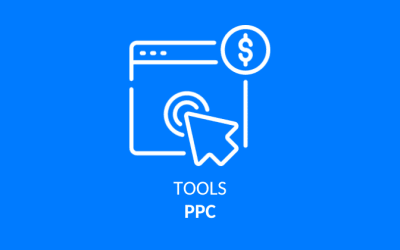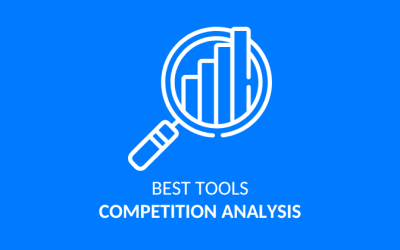The 10 best SEM tools
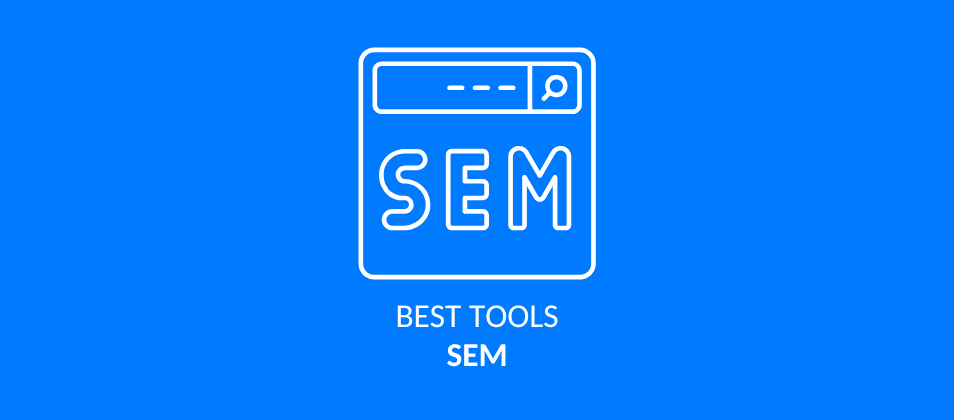
Thinking about boosting your business with advertising but unsure which tools are best for the job? To make things easier, this post compiles 10 of the best SEM tools you could use in 2025 to manage your advertising strategy.
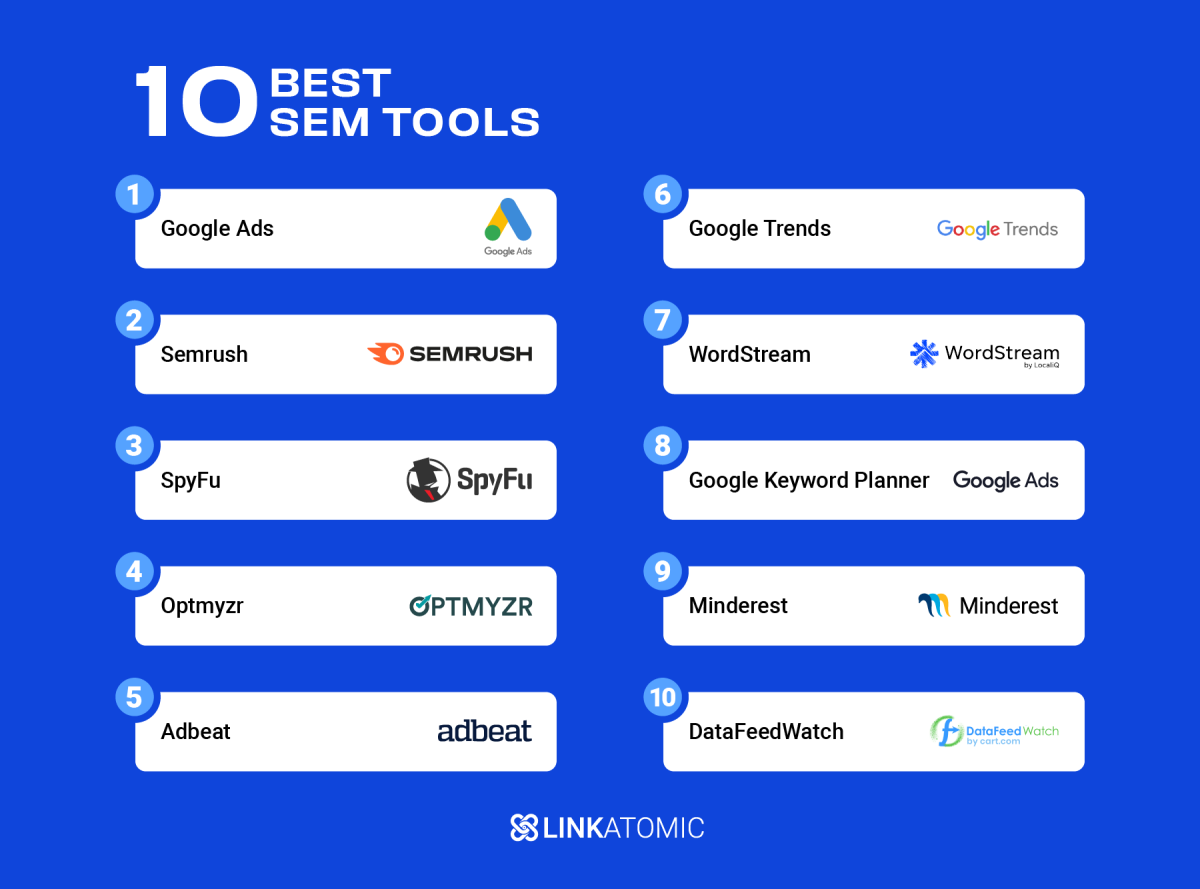
1. Google Ads

The essential tool, everyone uses it, from freelancers to top SEM agencies. In fact, the rest of the tools on this list are designed to be used alongside this platform.
Google Ads is Google’s own tool that lets you create, manage, and monitor your advertising campaigns across its search engine, YouTube, and other platforms within the Google Ads network.
With Google Ads, you can identify the keywords you want your business to appear for, set clear objectives, segment your audience to reach your exact potential customers, and track your campaign performance in great detail.
It’s one of the most comprehensive tools out there (if not the most comprehensive), and as long as you’re running paid campaigns, you’ll have access to all its powerful features.
So useful, complete, and reliable is it that you could easily do without the rest of the tools on this list, and you wouldn’t miss them much.

Expert tip
If you’re working with a tight budget, it’s almost always best to stick with Google Ads and make the most of everything it offers.
On its own, Google Ads is more than enough to run effective ad campaigns, understand what’s working (and what’s not), and achieve solid results.
Once your budget grows, you can consider integrating other tools alongside Google Ads.

Rubén Vázquez
CEO de Linkatomic2. Semrush
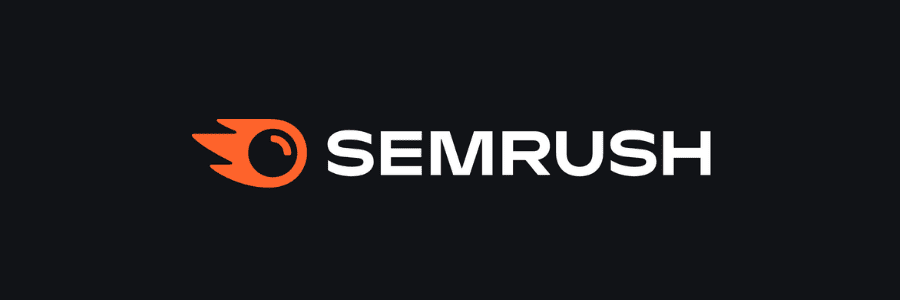
Semrush is an all-in-one marketing suite that lets you manage SEO, social media, and SEM. When it comes to SEM, it allows you to analyze your competitors to see their paid traffic volume and the keywords they’re bidding on.
It also lets you analyze and manage your own ad campaigns, providing data, metrics, and suggestions to help you improve them.
Since, in addition to all its SEM capabilities, it also includes tools for SEO, social media, and other marketing areas, it’s one of the most comprehensive SEM tools you can choose.
Just keep in mind that with so much value, it’s not exactly cheap, so it’s a good idea to use it only if you have a budget that can cover the cost.
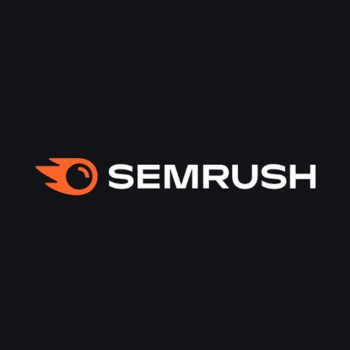
3. SpyFu
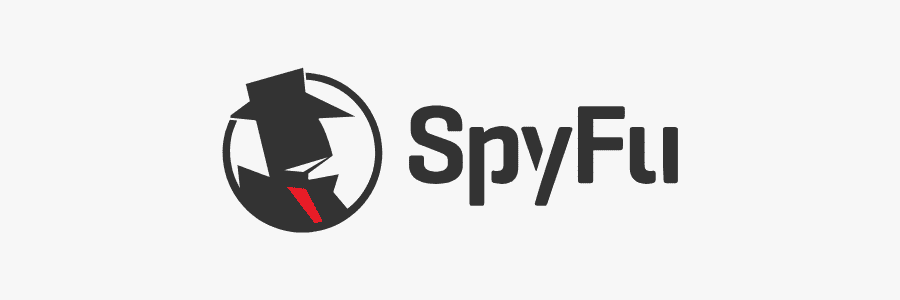
SpyFu is one of the most well-known SEM tools in the industry, and for good reason. It has a long-standing reputation and offers powerful features to analyze your own website as well as your competitors’, review campaigns, explore historical ad data, and much more.
When it comes to competitor analysis, few tools provide as much detailed insight into your competition as SpyFu. Beyond its SEM capabilities, it also includes an SEO section where you can research keywords, track rankings, analyze competitors, and more.
It offers excellent value for money and is significantly more affordable than options like Semrush. So, if you’re looking for a tool that gives you plenty of data to strengthen your SEM strategies, SpyFu could be the ideal choice.

4. Optmyzer
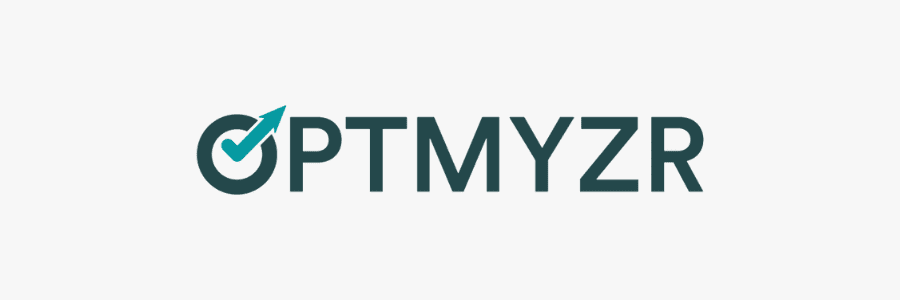
Optmyzer is an SEM platform that lets you centralize all your advertising campaign management and automate many of its processes to make your work easier. It includes powerful features to audit your campaigns in depth, detect opportunities, compare performance, and identify what’s working best.
With Optmyzr, you can also research keywords you want to target, automate ad spend, set up performance alerts, manage integrations, and much more.
When it comes to SEM, this is one of the most complete tools you’ll find. It integrates seamlessly with Google Ads and gives you the ability to manage everything from a single platform.
Few options offer as much as Optmyzr, especially since this tool is entirely focused on SEM, meaning its features are more refined and specialized. The only downside is that it tends to be expensive for small businesses with limited budgets.

5. Adbeat

Without data, there’s no way to build an effective SEM strategy, and Adbeat gives you exactly that: enough data to design high-performing campaigns.
While other tools focus on helping you manage, create, or automate campaigns, Adbeat specializes in market research. You can use it to analyze competitors, uncover their advertising strategies, estimate how much other businesses are spending, and more.
All of this helps you understand what makes other campaigns perform the way they do. That’s what makes Adbeat the ideal tool for handling all the research needed to develop strong SEM strategies.
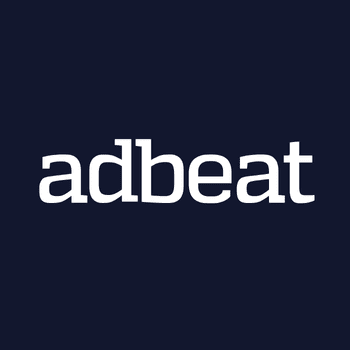
6. Google Trends
In the ranking of the best SEM tools: Google Trends #Trends #Content Click to TweetAnother tool from Google that provides invaluable data to help you understand your industry, see where the market is heading, spot trends, and design SEM strategies that make sense.
Google Trends is a platform that lets you explore search trends from all around the world.
With it, you can identify trending topics, spot products whose demand might be rising, and anticipate key moments to launch your campaigns at just the right time.
Best of all, it’s free, and it offers highly detailed data, as long as you know how to use it. Combine its insights with the data from Google Ads, and you’ll have plenty to build a high-performing advertising strategy.
7. WordStream

WordStream is a well-known SEM tool that allows you to audit your advertising strategy, dive deeper into your campaign performance, research keywords, and more.
This tool has a long track record and a strong reputation. Best of all, you can try out some of its features and solutions through the many free resources it offers.

8. Google Keyword Planner

Google Keyword Planner is a tool within Google Ads, easily one of the platform’s most powerful and essential features for advertising your website where it truly matters. All you need is a Google Ads account to access it.
As its name suggests, it’s focused on keyword research. It provides data such as estimated search volume, average cost per click, keyword competition level, and more.
Its insights are so valuable that many third-party SEO and SEM tools rely directly on Keyword Planner’s metrics.
With the data Google Keyword Planner provides, you can know exactly which keywords are worth bidding on, often the difference between a successful campaign and one that fails to deliver results.

9. Minderest

Minderest is a unique SEM tool because it focuses specifically on product price analysis, helping you determine the optimal price ranges for your products. To do this, Minderest uses AI to analyze millions of products and their prices.
Beyond this powerful feature, it also lets you analyze competitors, see which product categories are selling best, and review their pricing strategies.
On top of that, it offers dynamic pricing functionality, which uses AI to automatically adjust your product prices to match what your customers are most likely to pay.
It’s not a tool suited for every type of business, but for eCommerce, its insights are worth their weight in gold.

10. DataFeedWatch

Another excellent SEM tool for eCommerce, DataFeedWatch helps you fine-tune your SEM campaigns for Google Shopping, optimizing your product feeds so they meet Google’s ideal requirements and deliver the best results.
DataFeedWatch also helps you adapt your product feeds to other channels beyond Google Merchant Center, allowing you to centralize feed management and ensure your product listings perform at their best.

What tools are essential for managing your SEM strategies?
To manage your SEM strategies effectively, the essential tools are Google Ads, which allows you to create, manage, and monitor your campaigns; Google Keyword Planner, to cover all your keyword research needs; and Google Analytics, to track website visits, conversion events, and more.
How to choose the right tool for your business?
To choose the ideal SEM tool, consider your business’s needs, the features you require, the tool’s usability, and your available budget. The key is to go for a tool you can actually use efficiently, that offers what you need, and fits within your price range.
What’s the best platform for managing SEM campaigns?
The best platform to create, manage, and monitor your SEM campaigns is Google Ads. It’s free, packed with powerful features, and its data comes directly from Google, making it far more reliable than that of any other tool.
Beyond that, if needed, nearly any third-party platform integrates seamlessly with it, so you can always expand its already impressive capabilities with tools like Optmyzr, Semrush, or Adbeat.
Expert tip
When it comes to SEM, and given how crucial it is, it’s always best to start by getting familiar with the main tool, which is Google Ads, since you can’t do much without it.
Google Ads is the only truly essential platform if you want to run SEM campaigns.
Once you understand how to use it and can make the most of its features, you can then consider adding other tools to your toolkit.

Laura García
SEO and Link Building Campaign ManagerIf you’ve been struggling to choose an SEM tool, now you know 10 of the best options, what each one can help you with, what they excel at, and which types of businesses they’re best suited for.
Do you do more than just SEM? Then it’s worth going a step further and exploring the best digital marketing tools, you’ll find plenty of options to help you grow your business.

Author: Otto F. González
Do you need help with your SEO and branded content strategy?
In Linkatomic we offer you 30.000 newspapers and blogs to improve your visibility on the internet.
